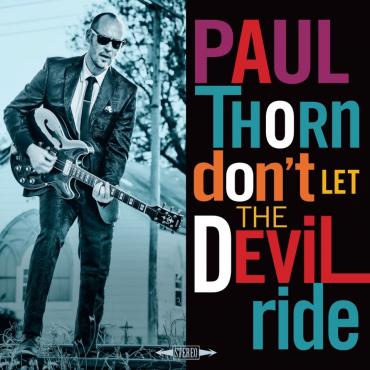Paul Thorn Doesn’t Let the Devil Get His Due

The power of Southern gospel grows out of a palpable belief that the devil waits around every corner to tempt individuals, even as Jesus lurks behind every pine tree to save these folks from the devil’s wiles. The most energetic gospel music depicts this apocalyptic struggle between good and evil; in plainer terms, the battle has often been described as a conflict between Saturday night carousing and Sunday morning faith. The same preacher who’s been out drinking at the local juke joint on Saturday night is preaching a hellfire and brimstone sermon to the same people he was drinking with the previous evening.
Southern gospel captures the dualism of human nature in powerful shouts, screams, claps, stomps, and call-and-response verse and choruses that lift the singers out of this world to the ethereal world beyond the clouds they’re singing about. This music not only revives weary spirits but also offers hope of a new, more glorious world where the devil — whether in the guise of simple evil or in the form of various kinds of systemic social oppression — can no longer capture one’s soul.
Listening to Paul Thorn’s new album, Don’t Let the Devil Ride, is like going to an old-fashioned tent revival meeting, where you move in a trance to the hypnotic repetition of the soulful, bluesy music and where you find yourself writhing in joy on the threshing floor. Thorn, the son of a Pentecostal preacher, knows exactly how to move the crowd, and he cannily opens the album with “Come On Let’s Go,” a driving, foot-stomping, hand-clapping, get-your-soul-right, call-and-response chorus that opens with a “Pops” Staples guitar riff before roaring off into an urgent cry to “come on let’s go/to the house of the Lord.” Thorn even plays the role of the preacher at the close of the song when he yells, “Revival time! Come on let’s go.” “The Half Has Never Been Told” — a tune found on a 1926 Blind Joe Taggart record — is a choogling, raw blues that features the tagline of the title as a chorus that offers a knowing nod-and-a-wink to the congregation: Even folks who called themselves saved aren’t telling the whole truth about their dark sinful acts.
Thorn and his band — featuring the Blind Boys of Alabama, Bonnie Bishop, and the McCrary Sisters — turn in a bright, jazzy version of the old Mississippi Fred McDowell chestnut “You Got to Move.” Thorn preaches in his gruff, gravelly voice on the old Willie Davis song, “He’s a Battle Axe”; this New Orleans-flavored version feels like a parade celebrating the power of God. The sax on the bridge delivers a jaunty, let’s-dance-and-sway, feel to the celebratory march. “Something on My Mind” takes a page from Freddie King; it’s a slow blues shaker that — in the way of blues and spirituals — repeats the same phrases in the chorus to emphasize the soulful urgency of the message about death and the afterlife: “there’s something on my mind that’s worrying me.” “Soon I Will Be Done” joyously, almost rapturously, celebrates going home to Jesus in heaven after a weary life on earth. Thorn and his band and choir join in on a slow, heavenly version of “Love Train” that features an out-of-this-world chorus and piano and B3 call-and-response on the bridge and then as the song fades out. The final track, called “…The Get Back,” (as in a revival service where the last song returns to the opening song) opens with a screaming B3 and urgently continues the chorus of “Come Let’s Go,” with Thorn closing the short chorus with the words “come on let’s go to the house of the Lord.”
There’s a powerful spirit on Thorn’s album, and it’s the spirit of love. “Where I grew up in Mississippi,” says Thorn, “there were black churches and white churches, and we’d go to services at all of them. Black churches had an R&B style of gospel; white churches had a country style of gospel. I like to try to bring people together. I learned from watching my dad how he communicated care for people. I let my fans know that I love them.” His desire to bridge any divides and to bring folks together through the spirit of love shines through every song on this album. In spite of the pervasive darkness of the world around us and in the human soul, Thorn’s music joyously celebrates the hope and love that shines through all darkness.




